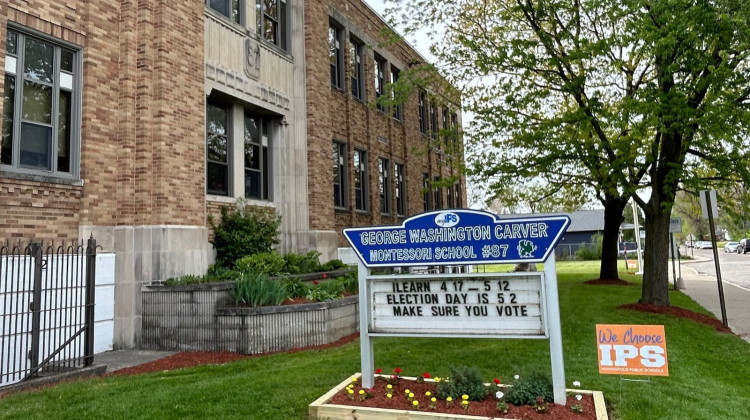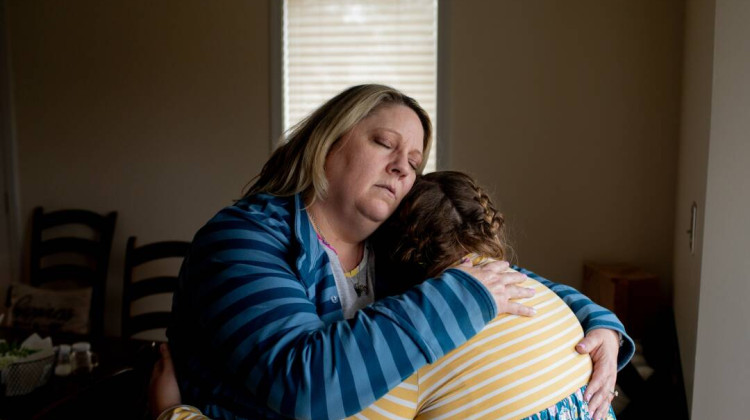Like many parents, Violeta Ventura relies on a bus to get her children to and from school every day.
But Ventura says that service has become increasingly unreliable at Greater Clark County Schools, where her two children are students. District officials have canceled their bus route frequently this semester, including for the entire first week of April.
“It causes me to think that I’m not part of my community,” Ventura said. “Although I’m paying taxes and I do my part to improve our community, I don’t have that support. It causes stress in our family. It causes stress in my finances and my schedule, in my driving habits coming from work at night [and] in the morning.”
Ventura said she sometimes doesn’t find out she’ll have to adjust her schedule until the night before or the morning of.
Each time it happens, she loses nearly two hours out of her day transporting her kids, who attend different schools in the district.
“With the gas prices being so high and sitting in car lines for an hour or two, it’s a financial struggle, also,” Ventura said.
Lacy Phillips, who also has a child in Greater Clark schools, said her son’s route was canceled a few times last year, but it became a recurring issue around the third week of this semester.
“We were given a notification that our bus would be canceled, I think it was two days out of that week,” Phillips said. “Every week but one since then, there have been two or more days of disruption. So it’s not just a day here and a day there.”
Phillips started tracking the cancellations on a calendar. She said her son’s bus route was canceled 21 times in the first 12 weeks of classes this semester.
That’s caused her to reschedule work appointments or cancel them entirely.
“When I have to adjust my day and move my client appointments around, it makes me look very unprofessional,” Phillips said. “I don’t know what’s going on day to day, so I have taken to not scheduling things during the blocks of time that I may have to wait in the car rider line, which is lost income.”
Phillips said virtual learning options were much more robust at the height of the pandemic. Last year, students who couldn’t attend in-person classes had access to teacher-led instruction through online platforms. Now, Phillips said they don’t have access to the lessons being taught in the classroom, only take-home assignments.
“What is shocking to me is that we were all really concerned with learning loss during times when we had to quarantine, when kids weren’t in the classroom because of the need to self-isolate,” Phillips said. “It was a huge problem. But when kids aren’t in the classroom because of transportation failures, no one seems to be having the same level of concern about that.”
What’s led to bus driver shortages
Greater Clark Transportation Director Daniel Borders said there’s a few reasons behind the bus cancellations: the pandemic, labor shortages and federal licensing guidelines among them.
He said daily cancellations fluctuate based on drivers calling in sick, and nine drivers are currently out on medical leave for surgeries or other issues. Some of the district’s older bus drivers either retired or took time away when COVID-19 hit.
When coronavirus case numbers were higher in the fall and winter, Borders said fewer students rode the bus, so the district was able to shift drivers to cover open routes more easily.
“Now, as all the students are coming back and we’re getting full buses again, we’re having to drive full routes,” he said. “We’re really starting to feel the pinch. And with the labor shortage, basically nationwide [and] statewide, that’s creating a lot of issues.”
Greater Clark is struggling to fill those vacancies. And contracting restrictions prevent them from canceling certain routes, meaning some parents, like Phillips and Ventura, are affected more often.
Borders said new federal regulations that took effect in February have made it harder to get a commercial driver’s license (CDL), which is required to drive a school bus.
Administrators have tried several avenues to alleviate the problem. The district altered its contracting process by making it easier for drivers to bid on routes and lease equipment, along with boosting benefits packages.
They’ve also reached out to staff and parents to find people who are interested in training to be a driver.
“And we have received an overwhelming amount of response,” Borders said. “As of [April 14], I’ve probably had 15 responses, as far as parents getting involved and community members wanting to come in. The issue, again, comes back to the federal guidelines, where it can take six months to train someone to drive a CDL.”
Borders said things are getting better: the district began the semester with 10 open bus routes, and it’s now down to two. Two new drivers started this week.
How changes at federal and state levels could help
Greater Clark administrators discussed the issue last week at a meeting in Indianapolis with the Indiana Department of Transportation. The district has eliminated about a dozen bus routes that were deemed “inefficient” in the last three years. Fewer routes means the district would need fewer drivers. Borders said new state laws set to take effect this summer could mean even more cuts.
Over the summer, administrators will review current routes to identify opportunities for improvement and consider adjusting school start times.
At the federal level, Borders said he would like to see changes to licensing requirements so local districts can have more control and become a “one-stop shop” for training.
Greater Clark isn’t alone in its calls for change or its struggles with bus routes. New Albany Floyd County Schools Superintendent Brad Snyder said though his district is currently canceling fewer routes than it was earlier in the pandemic, the driver shortage could pose a long-term threat.
Snyder said federal officials should create a new, separate protocol for school bus drivers.
“I understand that the intention was to create more public safety for commercial drivers across the country,” he said. “But there’s a big difference in being able to drive a truck… from New York to Los Angeles, as compared to picking up kids from an elementary school and driving them for 45 minutes. Those are two different skills, those are two very different jobs, but the license is the same.”
Until the situation improves, parents like Phillips said they want more information about the cancellations and the steps the district is taking to fix the issue.
She said her frustration over what she sees as a lack of communication from Greater Clark officials has prompted her to explore other education options.
“I’ve talked with at least three people who said they are considering withdrawing their child from the district next year and putting them in a private option. That’s also something that I’ve considered,” she said. “So that’s not a good look for [Greater Clark]. I have been very happy with my child’s school, the teachers there and the leadership of that individual school. Where my frustrations have lain has always been with the corporation.”
John is the Health/Southern Indiana Reporter for WFPL. He is a corps member with Report For America, a national service program that places
 DONATE
DONATE







 Support WFYI. We can't do it without you.
Support WFYI. We can't do it without you.